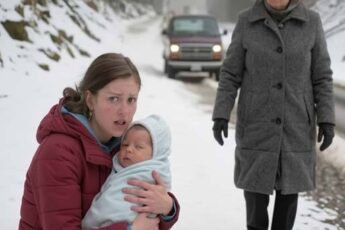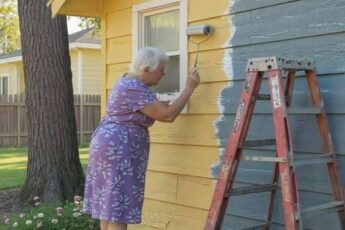The call to the police station ended as abruptly as it began.
“Help, my parents, they—” a young boy’s voice cracked through the line, trembling, before a deeper voice interrupted sharply:
“Who are you talking to? Hand me that phone!”
And then — silence.
The officer on duty exchanged a troubled glance with his partner. According to protocol, they had to respond, even if it was a prank or an accident. But there was something in the child’s tone — that fragile edge of fear, that shiver in his voice — that made both men uneasy.
Minutes later, their patrol car rolled quietly down a suburban street lined with identical houses. The two-story home looked flawless from the outside: manicured lawn, flower beds, curtains neatly drawn. Too perfect.
The officers knocked. Nothing. A few seconds stretched into what felt like minutes. Then, slowly, the door creaked open.
Standing there was a boy no older than seven. Dark hair. Clean clothes. But his gaze… it wasn’t a child’s gaze. It was far too serious, steady, and heavy for his age.
“Were you the one who called us?” one officer asked softly.
The boy gave a small nod, then stepped aside. His voice was barely above a whisper.
“My parents… they’re in there.” He lifted his hand and pointed down the hallway, toward a half-open door.
The officer crouched slightly to meet his eyes. “Are they okay? Did something happen to your mom and dad?”
The boy didn’t answer. He only pressed his back against the wall, his wide eyes fixed on that door, as though something inside terrified him too much to speak.
The first officer moved cautiously toward it. His partner stayed near the child, hand hovering close to his radio. The hallway seemed to stretch longer with every step.
Finally, he reached the door. One breath. One push.
The hinges groaned as the room came into view—
And in that instant, his heart nearly stopped at what he saw.
The room was dim, curtains drawn tight, the air heavy with something stale and sour. At first, it looked empty — until the officer’s eyes adjusted.
On the floor, near the bed, lay two figures. A man and a woman. Their faces pale, lips tinged blue. Beside them — empty bottles, syringes scattered like discarded toys.
The officer’s stomach lurched. This wasn’t just exhaustion or sleep. It was worse. Much worse.
He knelt down quickly, checking for a pulse. Nothing. His partner, realizing the gravity, rushed to radio for backup and medical support.
Behind them, in the hallway, the boy stood frozen, his small hand gripping the doorframe. His expression didn’t change — as if some part of him had already known.
“Son,” the officer said carefully, trying to keep his voice steady, “how long have your parents been like this?”
The boy blinked slowly, then whispered:
“Since yesterday. I tried to wake them. They wouldn’t move. I was scared. I didn’t know what to do.”
His voice cracked on the last word, and for the first time, tears welled in his dark eyes.
The officer’s throat tightened. He exchanged a heavy glance with his partner — a look that said everything without words.
Gently, he crouched down, placing a hand on the child’s shoulder.
“You did the right thing calling us,” he murmured. “You were very brave.”
But the boy didn’t respond. He just stood there, staring into the room where his parents lay, as if some piece of his childhood had ended the moment he picked up that phone.
Outside, the quiet suburban street still looked perfect. Flowers still bloomed in neat rows. Curtains still swayed in the breeze.
But behind this door — a little boy’s world had collapsed.
And for the officers who answered his call, that image would stay with them forever.







